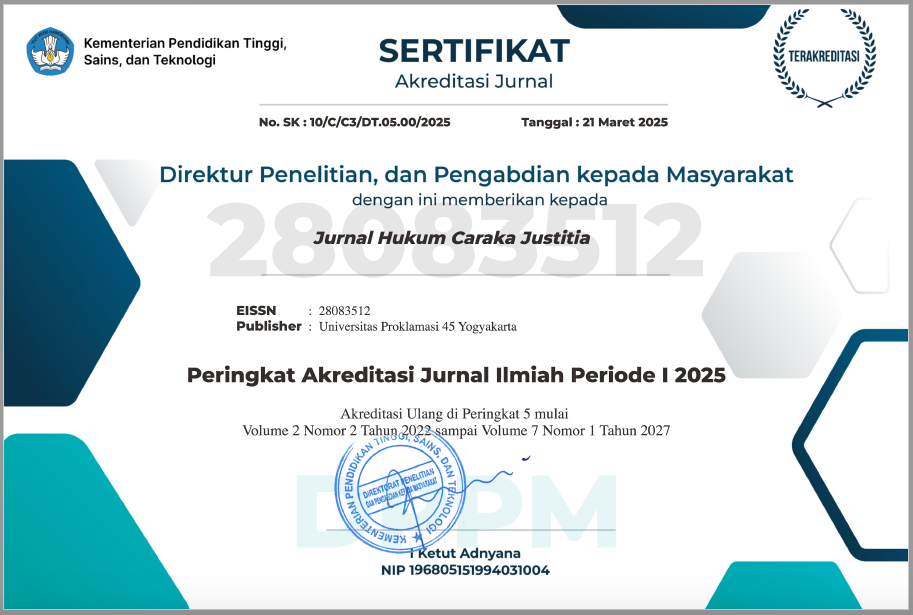Pembentukan Keluarga Sakinah dan Problematikanya pada Keluarga Muslim di Kota Banjarmasin dalam Perspektif Sosiologi Hukum Islam
DOI:
https://doi.org/10.30588/jhcj.v2i1.1034Keywords:
Sakinah Family, Muslim Family, Banjarmasin, Sociology of Islamic Law.Abstract
The family is the smallest form of society, the good and bad of society are strongly influenced by the good and bad of a family. Therefore, fostering and empowering the family becomes a necessity. And the more modern human life is, the more complex the problems faced will be considering the increasingly complex problems faced by mankind. The effort to create a sakinah family is no exception. For this reason, this study seeks to map the problems in realizing a sakinah family, especially in the Banjarmasin City area, South Kalimantan.
This article highlights two things, first, efforts to establish a sakinah family and its problems in Muslim families in Banjarmasin City. Second, efforts to establish and overcome the problems of the sakinah family in Muslim families in Banjarmasin City in the perspective of Sociology of Islamic Law. The Sociological Approach of Islamic Law was chosen for analyzing this research because not achieving a sakinah family cannot be separated from social aspects, both in the family realm and in the wider community.
References
Artikel Jurnal
Anwaruddin. “Konsep Sakinah Menurut Hakim Perempuan di Pengadilan Agama Bantul, Yogyakarta”. Jurnal Al-Ahwal 7, no. 1 (Juni 2014): 57-68. https://ejournal.uin-suka.ac.id/syariah/Ahwal/article/viewFile/1070/977.
Hidayat, Syarif. “Konsep Keluarga Sakinah dalam Tradisi Begalan”. Jurnal Al-Ahwal 7, no. 1 (Juni 2014): 85-96. https://ejournal.uin-suka.ac.id/syariah/Ahwal /article/viewFile/07107/984.
Ridla, M. Rasyid. “Sosiologi Hukum Islam: Analisis terhadap Pemikiran M. Atho’ Mudzhar”. Al-Ihkam: Jurnal Hukum dan Pranata Sosial 7, no. 2 (Desember 2012): 293-304. https://ejournal.iainmadura.ac.id/alihkam/article/download/330/321.
Buku
Abdullah, M. Amin. Antologi Studi Islam: Teori dan Metodologi. Yogyakarta: Sunan Kalijaga Press, 2000.
Departemen Agama Republik Indonesia. Al-Qur’an dan Terjemahnya. Jakarta: Yayasan Penerbitan Al-Qur’an, 1995.
Ditjen Bimas Islam. Petunjuk Teknis Pembinaan Gerakan Keluarga Sakinah. Jakarta: BP4 Pusat, 2003.
Hasbiyallah. Keluarga Sakinah, cet. ke-1. Bandung: PT. Remaja Rosdakarya, 2015.
Kementerian Agama Republik Indonesia. Pedoman Pembentukan Gerakan Keluarga Sakinah. Jakarta: Kementerian Agama, 2005.
Mardalis. Metode Penelitian Suatu Pendekatan Proposal. Jakarta: PT. Bumi Aksara, 2007.
Shihab, M. Quraish. Membumikan Al-Qur’an (Fungsi dan Peranan Wahyu dalam Kehidupan Masyarakat). Jakarta: PT Mizan Publika, 2000.
Shihab, M. Quraish. Pengantin Al-Qur’an. Jakarta: PT Mizan Publika, 2005.
Downloads
Published
How to Cite
Issue
Section
License
Copyright (c) 2022 Malik Ibrahim

This work is licensed under a Creative Commons Attribution 4.0 International License.
Authors who publish with JHCJ agree to the following terms:
Authors retain copyright and grant the JHCJ right of first publication with the work simultaneously licensed under a Creative Commons Attribution 4.0 International License that allows others to share (copy and redistribute the material in any medium or format) and adapt (remix, transform, and build upon the material) the work for any purpose, even commercially with an acknowledgment of the work's authorship and initial publication in JHCJ.
Authors are able to enter into separate, additional contractual arrangements for the non-exclusive distribution of the journal's published version of the work (e.g., post it to an institutional repository or publish it in a book), with an acknowledgment of its initial publication in JHCJ. Authors are permitted and encouraged to post their work online (e.g., in institutional repositories or on their website) prior to and during the submission process, as it can lead to productive exchanges, as well as earlier and greater citation of published work (See The Effect of Open Access).














